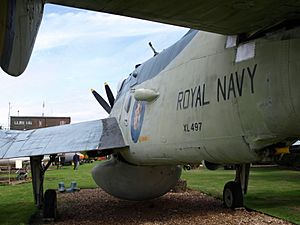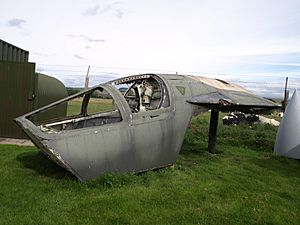Dumfries and Galloway Aviation Museum facts for kids
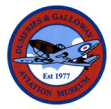 |
|
| Lua error in Module:Location_map at line 420: attempt to index field 'wikibase' (a nil value). | |
| Established | 1977 |
|---|---|
| Location | Dumfries, Dumfries and Galloway |
| Type | Aviation museum |
The Dumfries and Galloway Aviation Museum is a special museum in Scotland all about airplanes. It's run by volunteers who love aviation history. The museum is located in an old control tower from World War II at a former airbase called RAF Dumfries. This airbase was used from 1940 to 1957.
The museum has a cool collection of airplanes, jet engines, and other artifacts. It also has a growing display that honors airborne forces, the brave soldiers who parachuted into battle.
Contents
The Museum's Story
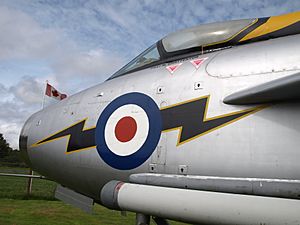
How It All Began
The museum opened to the public in 1977. It was started by the Dumfries and Galloway Aviation Group. At first, the museum was in a small pilot's hut. This building had a long history with flying, as it was also used by a local gliding club.
The first complete airplanes on display were a de Havilland Vampire T11 and a Gloster Meteor T7. These planes came from a Royal Air Force base about 80 miles away. The museum's opening ceremony was led by Michał Cwynar, a decorated Polish fighter pilot from World War II.
By 1979, the museum had more planes, including a North American F-100 Super Sabre and a Lockheed T-33 Shooting Star. It needed more space, so it moved into the three-story control tower, where it is today.
Engines with Amazing Histories
Many of the museum's exhibits have incredible stories. These displays help us remember the events and people of the past.
The Wellington Bomber Engine
On a night in June 1943, a Vickers Wellington bomber plane was trying to land at RAF Dumfries. Sadly, one of its engines failed, and the plane crashed. Three of the five crew members were killed.
In the 1970s, the plane's two Bristol Hercules engines were recovered from the crash site. One of these engines, with its wooden propeller still attached, is now on display at the museum. This exhibit is a memorial to the crew.
The Experimental Flying Boat Engine
The museum also has an engine from a very rare plane called the Blackburn B-20. This was an experimental flying boat, a plane that could land on water. It had a special feature: the bottom part of its hull could be lowered into the water.
In 1940, the plane crashed into the sea during a test flight because of a problem with its ailerons (the flaps on the wings). The wreck of the plane is considered a war grave, so it is left undisturbed on the seabed. However, in 1998, one of its Bristol Centaurus engines was accidentally caught in a fishing net and pulled up. This engine is now part of the museum's collection.
The German Bomber Engine
Another engine on display is from a German Heinkel He 111H-4 bomber. In August 1940, during a mission, the plane got lost in bad weather. It crashed into a mountain in Scotland, and the four crew members were killed. One of its Junkers Jumo 211 engines was later recovered and is now exhibited at the museum.
Aircraft on Display
The museum has a fantastic collection of aircraft from different countries and time periods.
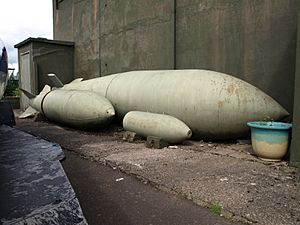
- BAC Jet Provost T.4 XP557
- Bristol Sycamore 3 WA576 (a type of helicopter)
- Dassault Mystère IVA 8-NY
- English Electric Canberra T.4 WJ880
- English Electric Lightning F.53 ZF584
- Fairey Gannet AEW.3 XL497
- General Dynamics F-111E 68-060 – Escape capsule
- Gloster Meteor T.7 (mod) WL375
- Handley Page Jetstream T.2, XX483
- Hawker Hunter F.4 WT746
- Hawker Siddeley Buccaneer S.2B XT280
- Hawker Siddeley Trident 3B G-AWZJ (a passenger airliner)
- Lockheed T-33A FT-36 "Little Miss Laura"
- North American F-100D Super Sabre 54-2163
- Saab J 35A Draken 35075
- Supermarine Spitfire IIa P7540 (a replica of the famous WWII fighter)
- Westland Wessex HU.5 XT486 (a type of helicopter)
See also
- List of aerospace museums
 | Delilah Pierce |
 | Gordon Parks |
 | Augusta Savage |
 | Charles Ethan Porter |


